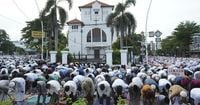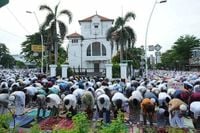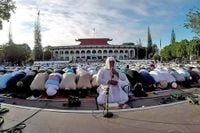The festive atmosphere surrounding Eid al-Fitr, marking the end of Ramadan, faces a mixed reception across Asia this year, with economic challenges impacting celebrations in Indonesia and India. Meanwhile, in India, the Reserve Bank of India (RBI) has announced that banks will remain open on March 31, 2025, contradicting expectations of a holiday due to Eid.
In Indonesia, the usual excitement of the Eid al-Fitr holiday is dampened this year as soaring prices for food, clothing, and essential goods weigh heavily on the population. Consumer spending in the lead-up to the holiday has declined compared to last year, with a projected slowdown in cash circulation due to fewer travelers. This year, approximately 146 million people are expected to travel for the holiday, marking a notable 24% decrease from the previous year’s 194 million travelers.
According to the Indonesian Chamber of Commerce and Industry, the money circulation during Eid is anticipated to reach 137.97 trillion rupiah (approximately $8.33 billion), down from 157.3 trillion last year. This declining trend reflects a broader economic strain, with Bank Indonesia’s Consumer Confidence Index dipping to 126.4 in February 2025, down from 127.2 in January.
Bhima Yudistira, the executive director of the Center for Economic and Law Studies (Celios), noted that economic hardship, currency depreciation, and mass layoffs in manufacturing have weakened both corporate earnings and worker incomes, suppressing consumer spending. “These trends indicate the economy is under strain,” Yudistira stated, adding that he expects a less vibrant festive season.
Despite these challenges, Indonesian government officials remain optimistic. Chief Economic Affairs Minister Airlangga Hartarto highlighted that Eid usually stimulates economic activity through increased spending. To bolster this, the government has introduced several incentives, including airfare discounts, toll road fee reductions, nationwide online shopping events, direct cash assistance for 16 million households, and tax exemptions for labor-intensive sectors. Hartarto expressed hope that these measures would sustain consumer spending and support economic stability.
In India, where Muslims are celebrating Eid with special prayers, family gatherings, and festive meals, the atmosphere is tinged with concern. The minority community faces increasing vilification from hardline Hindu nationalists, which adds a layer of tension to the festivities. Additionally, Muslim groups are protesting against a proposal by Prime Minister Narendra Modi’s government aimed at changing laws governing Muslim land endowments, which they argue is discriminatory.
In an effort to support underprivileged Muslims during this significant holiday, Modi’s Bharatiya Janata Party has launched a nationwide initiative called “Saugat-e-Modi,” or “Modi’s gift,” expected to provide food and clothes to over 3 million individuals. In New Delhi, thousands gathered at the Jama Masjid, one of the country’s largest mosques, to offer Eid prayers, sharing hugs and well-wishes. “This is a day of giving and receiving love. Even if you meet an enemy, meet them with love today,” remarked 18-year-old student Mohammed Nooruddin.
Meanwhile, in the Bangsamoro Autonomous Region in Muslim Mindanao (BARMM), March 31 has been declared a regular non-working holiday, with Sultan Kudarat also observing a special non-working holiday. Classes at all levels in public and private schools have been suspended for the day. The announcement of Eid's date was confirmed after the crescent moon was sighted by various groups, including the Bangsamoro Government and PAGASA, and validated by the Bangsamoro Grand Mufti Sheikh Abdulrauf Guialani.
In contrast, the Haryana government in India has declared March 31 a restricted holiday instead of a gazetted holiday for Eid-ul-Fitr. Employees who have already exhausted their restricted holidays will be granted an additional holiday. The notification indicates that private offices and institutions following the public offices’ holiday list will also observe March 31 as a holiday.
As the day unfolds, the contrasting experiences of Eid celebrations across these regions highlight the complex interplay of cultural traditions and economic realities. In Indonesia, the festive spirit is subdued as families cut back on celebrations due to financial constraints. In India, while prayers and community gatherings continue, underlying tensions and protests reflect the challenges faced by the Muslim community.
In both countries, the impact of economic conditions on the holiday’s observance serves as a reminder of the broader societal issues at play. As families navigate their circumstances, the essence of Eid, characterized by community, generosity, and reflection, remains a poignant aspect of this significant occasion.







